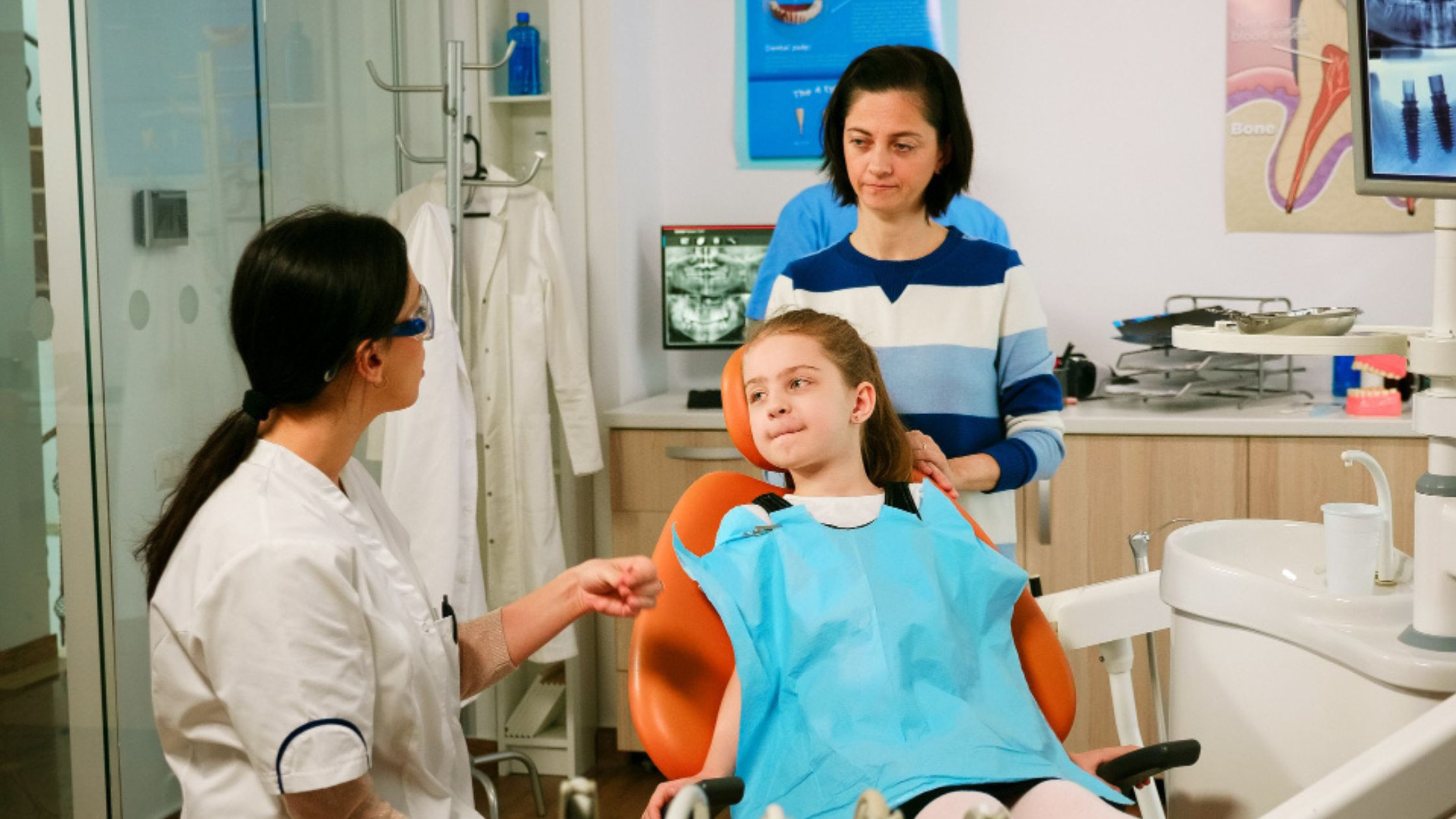Back-to-School Dental Tips for Kids and Teens
Posted on June 21, 2024 by Admin

Good dental habits start early and play a crucial role in maintaining oral health throughout life. For children and teenagers, developing a solid dental care routine not only ensures a bright smile but also promotes overall well-being. Here are some essential dental tips to help kids and teens maintain healthy teeth and gums:
Start Early with Dental Care:
Establishing good dental habits should begin as soon as your child's first tooth appears. Start cleaning your baby's gums with a soft cloth or infant toothbrush and water. As more teeth erupt, switch to a small, soft-bristled toothbrush and a smear of fluoride toothpaste (about the size of a grain of rice).
Brush and Floss Regularly:
Encourage your child to brush their teeth at least twice a day, in the morning and before bedtime. Use a pea-sized amount of fluoride toothpaste for children aged 3 and older. Teach them proper brushing techniques—circular motions along the gumline—and make sure they brush all surfaces of their teeth. Flossing should begin as soon as there are two teeth that touch each other.
Make Brushing Fun:
Turn brushing into a fun and positive experience. Use toothbrushes with their favorite cartoon characters, play their favorite song while they brush, or use a timer to make sure they brush for the recommended two minutes. Positive reinforcement and praise for good brushing habits can go a long way in making oral care enjoyable for kids.
Encourage a Healthy Diet:
A balanced diet rich in fruits, vegetables, whole grains, and lean proteins not only supports overall health but also contributes to strong teeth and gums. Limit sugary snacks and beverages, as sugar can lead to tooth decay. Encourage drinking plenty of water instead of sugary drinks to help rinse away food particles and acids that can harm teeth.
Must Read : Dental X-Rays: Why They Are Important for Diagnosis
Visit the Dentist Regularly:
Regular dental check-ups are essential for children and teens. Schedule dental visits every six months for professional cleanings, oral exams, and preventive care. Your dentist can detect early signs of dental issues, provide fluoride treatments or dental sealants for added protection, and offer advice on maintaining good oral hygiene at home.
Protect Teeth during Sports and Play:
If your child plays sports or engages in activities where there is a risk of dental injuries, encourage them to wear a mouthguard. Mouthguards protect teeth from being chipped, broken, or knocked out during sports and recreational activities, reducing the likelihood of dental emergencies.
Avoid Harmful Habits:
Discourage habits that can harm dental health, such as thumb sucking or using teeth as tools to open packages. These habits can contribute to misaligned teeth, jaw problems, and damage to tooth enamel.
Monitor Orthodontic Needs:
As children grow, monitor the development of their teeth and jaws. If you notice issues with alignment or spacing, consult an orthodontist for evaluation and potential treatment. Early intervention can help address orthodontic problems before they become more complex.
Educate About Oral Health:
Teach children and teens about the importance of oral health and how dental care directly impacts their overall well-being. Explain the consequences of poor oral hygiene, such as cavities, gum disease, and bad breath, to emphasize the importance of maintaining healthy habits.
Must Read : How Sealants Can Protect Your Teeth from Cavities
Lead by Example:
Children often learn best by observing adults. Set a good example by maintaining your own oral hygiene routine and prioritizing regular dental check-ups. Brush and floss together as a family to reinforce the importance of dental care and make it a shared activity.
Conclusion:
By following these dental tips, parents can help children and teens establish strong oral health habits that will benefit them for a lifetime. Remember, good oral hygiene not only leads to a healthy smile but also contributes to overall health and confidence. Start early, stay consistent, and make dental care a positive part of daily life.
Encourage open communication with your child's dentist to address any concerns and ensure they receive the best possible care. With proper dental care and regular check-ups, kids and teens can enjoy healthy teeth and gums well into adulthood.
Faqs
-
1. When should children start seeing the dentist regularly?
Children should see the dentist by their first birthday or within six months of their first tooth appearing.
-
2. How often should kids brush their teeth?
Children should brush their teeth at least twice a day with fluoride toothpaste.
-
3. Is fluoride toothpaste safe for children?
Yes, fluoride toothpaste is safe and helps prevent cavities by strengthening tooth enamel.
-
4. When should children start flossing?
Children should start flossing as soon as their teeth touch each other, usually around age 2 to 3.
-
5. Are dental sealants necessary for kids?
Dental sealants are recommended for children to protect their molars from cavities, especially in hard-to-reach areas.
-
6. How can parents help children overcome fear of the dentist?
Parents can help by choosing a pediatric dentist experienced with children, explaining dental visits positively, and avoiding sharing negative experiences.
Recent Post
- The Importance of Oral Health Education for Children
- How to Choose the Right Orthodontic Treatment for Adults
- The Link Between Oral Health and Stroke Risk
- How to Address and Prevent Gum Recession
- Innovations in Dental Anesthesia: Pain-Free Procedures
- The Role of Saliva in Oral Health: Functions and Disorders
- Exploring Holistic Dentistry: What You Need to Know
- How Oral Health Affects Your Immune System
- The Benefits of Using Dental Probiotics
- Oral Health and Pregnancy: Myths and Facts